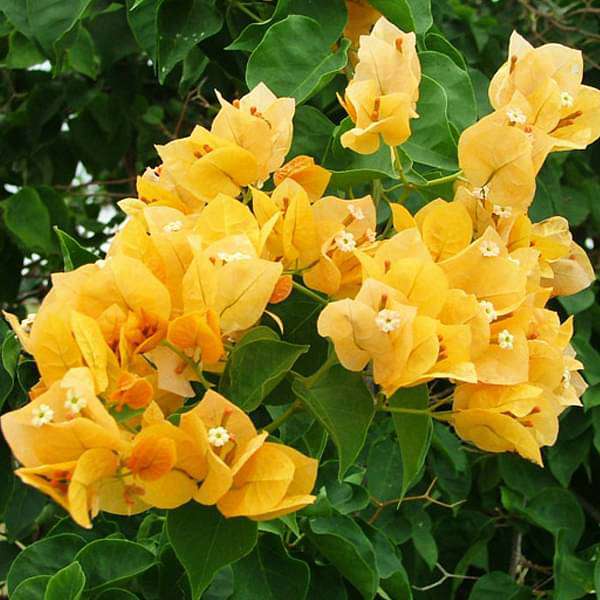
Bougainvillea (Yellow) - Plant
(MRP Inclusive of all taxes)
- Shipping ₹79 for entire order
- Dispatch in 7 days
- Country of origin: India

(MRP Inclusive of all taxes)
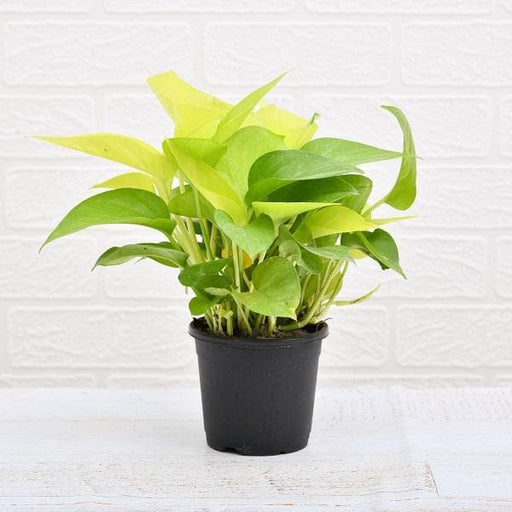 Save 29%
Save 29%
Air Purifier Money Plant with Pot The Air Purifier Money Plant, also known as Pothos or Epipremnum aureum, is a stunning indoor plant that...
View full details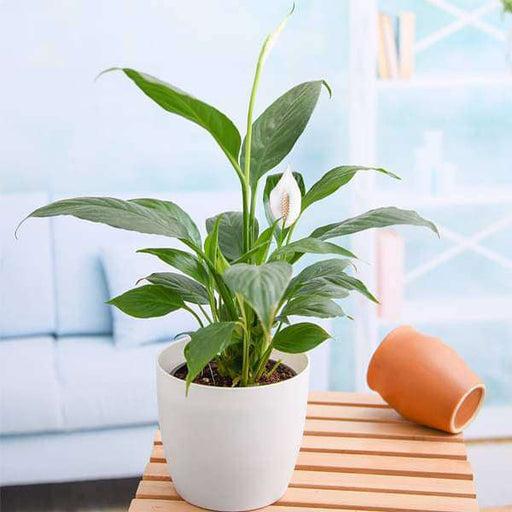
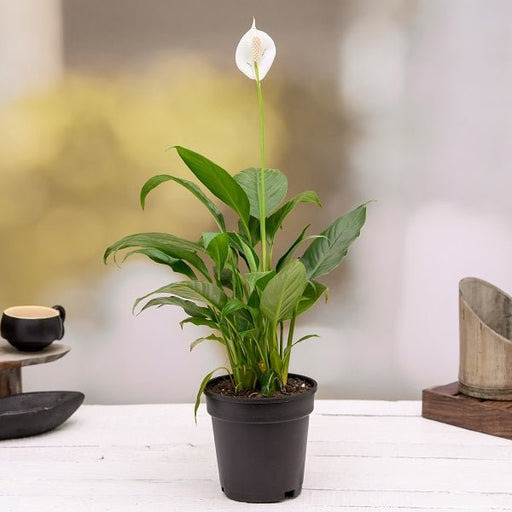 Save up to 15%
Save up to 15%
Peace Lily, Spathiphyllum - Plant The Peace Lily, scientifically known as Spathiphyllum, is a stunning houseplant celebrated for its elegant white...
View full details
 Save 25%
Save 25%
Jasminum sambac, Mogra, Arabian Jasmine - Plant Jasminum sambac, commonly known as Mogra or Arabian Jasmine, is a fragrant flowering plant...
View full details
 Save 18%
Save 18%
Combo Constituents Includes the Parijat Tree (Night-Flowering Jasmine), a culturally significant plant with fragrant flowers. Description The Pari...
View full details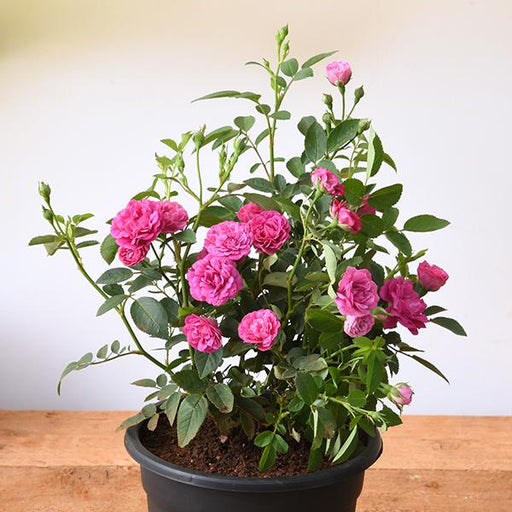
 Save 25%
Save 25%
Miniature Rose, Button Rose (Any Color) - Plant The Miniature Rose, also known as the Button Rose, is a charming and compact flowering plant that ...
View full details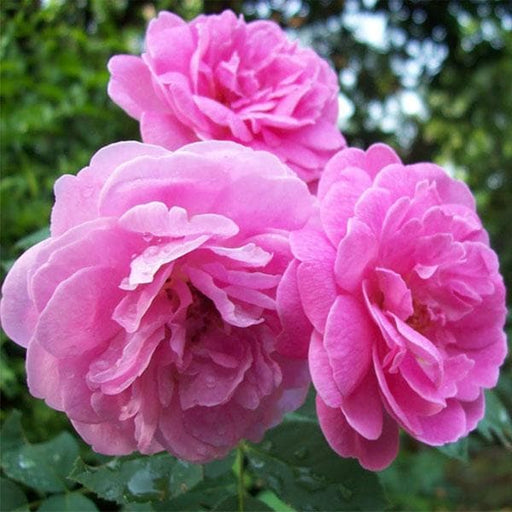 Save 25%
Save 25%
Damascus Rose, Scented Rose (Any Color) - Plant The Damascus Rose, also known as Rosa damascena, is a timeless symbol of beauty and romanc...
View full details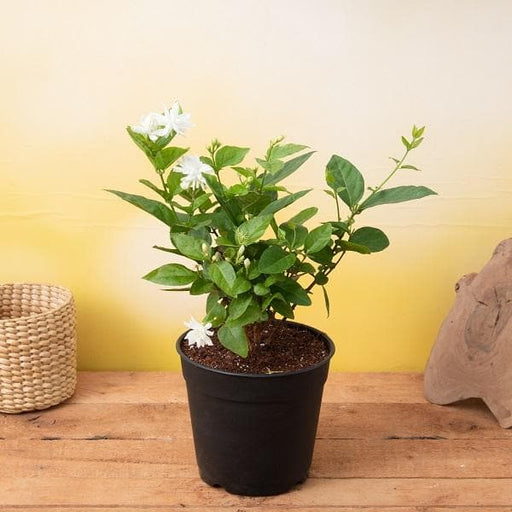
 Save 17%
Save 17%
Beautiful Fragrant Mogra, Arabian Jasmine Plant with Pot The Beautiful Fragrant Mogra, also known as Arabian Jasmine (Jasminum sambac), is...
View full details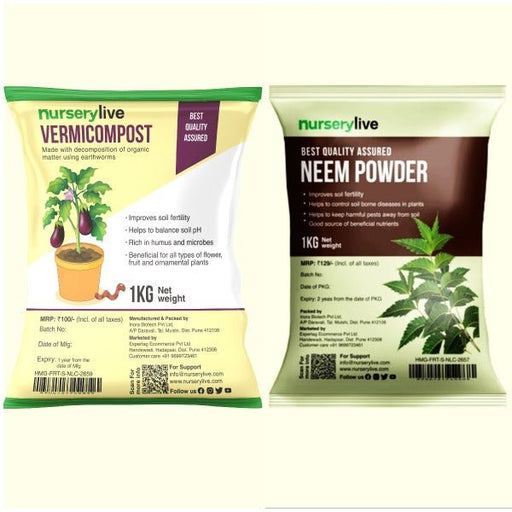 Save 15%
Save 15%
Pack of Vermicompost and Neem Cake for House Plants Transform your indoor garden with our premium Pack of Vermicompost and Neem Cake, spec...
View full details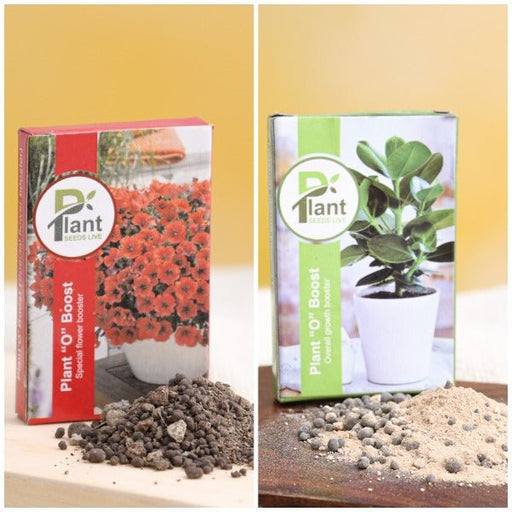
Pack of Plant Growth and Flower Boosters Unlock the full potential of your garden with our Pack of Plant Growth and Flower Boosters! This ...
View full details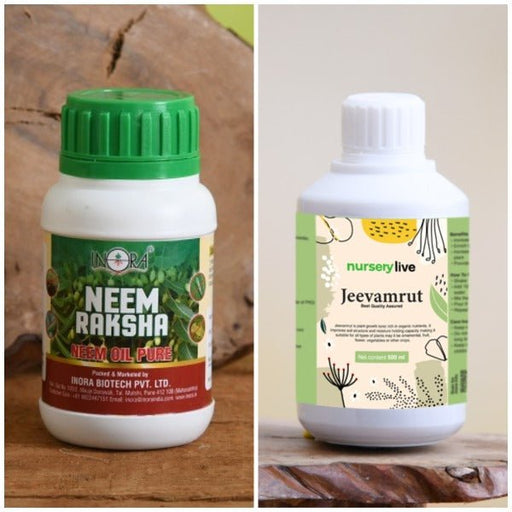 Save 38%
Save 38%
Combo of Jeevamrut and Neem Raksha for Easy Growth and Protection of Houseplants Transform your indoor garden with our exclusive combo of ...
View full details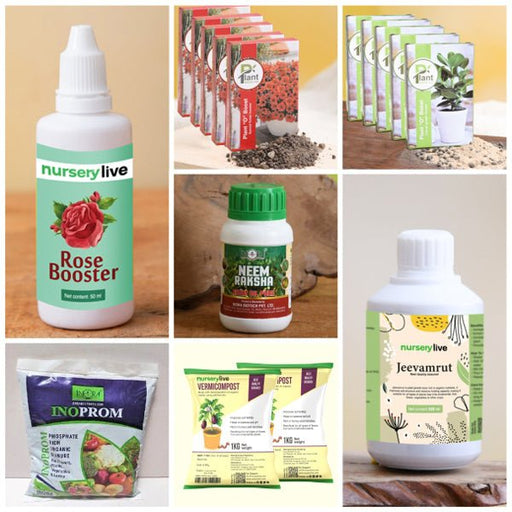 Save 22%
Save 22%
Plant Nutrients Kit (Pack of 16) for a Healthy Garden Transform your garden into a lush paradise with our Plant Nutrients Kit, featuring 1...
View full details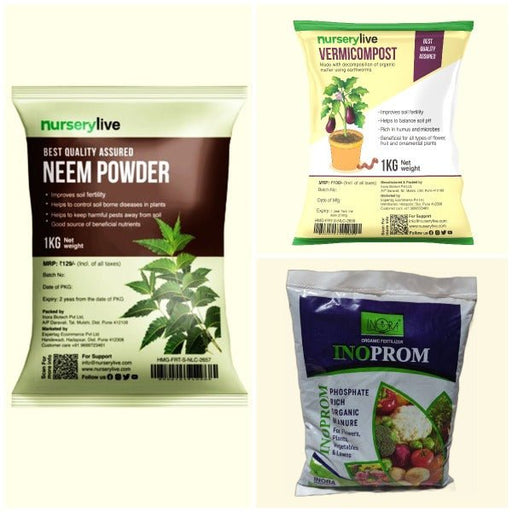 Save 16%
Save 16%
Combo of Top Plant Fertilizers Elevate your gardening game with our exclusive Combo of Top Plant Fertilizers, featuring two bags of premiu...
View full details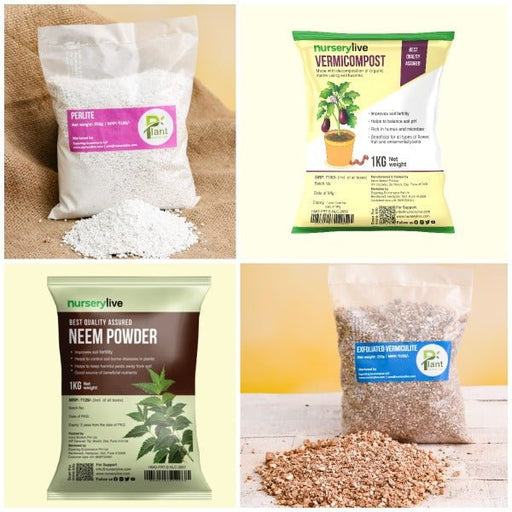 Save 24%
Save 24%
Pack of 4 Additives to Make Soil Healthy and Nutrient Rich Transform your garden into a thriving ecosystem with our Pack of 4 Additives de...
View full details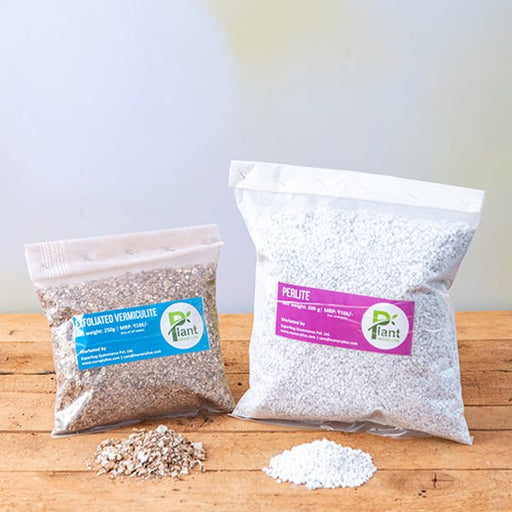 Save 30%
Save 30%
Transform your gardening experience with our premium Combo of Perlite and Vermiculite. This unique blend is designed to enhance soil aeration and ...
View full details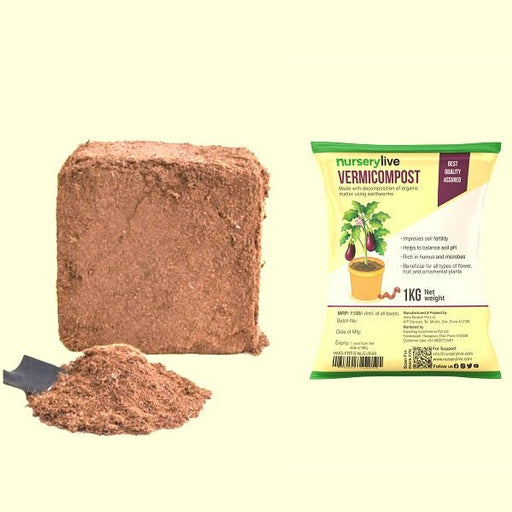 Save 27%
Save 27%
Combo of 2 Vermicompost and Cocopeat - Enrich Your Soil Naturally! Transform your garden into a thriving ecosystem with our Combo of 2 Ver...
View full details
 Save 35%
Save 35%
Best 6 Plants for Perfect Indoor Garden Transform your living space into a lush oasis with our curated collection of the Best 6 Plants for a...
View full details
 Save up to 50%
Save up to 50%
Mini Succulent Garden Pack Transform your space with our Mini Succulent Garden Pack, featuring a delightful collection of 4 any variety beautiful s...
View full details
 Save 30%
Save 30%
5 Best Fragrant Plants Transform your garden or indoor space into a fragrant paradise with our curated selection of the 5 Best Fragrant Plants. Th...
View full details
 Save 24%
Save 24%
Set of 2 Bonsai Looking Grafted Adeniums Transform your indoor or outdoor space with our exquisite Set of 2 Bonsai Looking Grafted Adenium...
View full details Save 45%
Save 45%
Top 4 Die Hard Succulents Pack Transform your indoor or outdoor space with our Top 4 Die Hard Succulents Pack, featuring a curated selecti...
View full details
 Save 30%
Save 30%
5 Best Indoor Plants Pack Transform your living space into a lush oasis with our '5 Best Indoor Plants Pack.' This carefully curated collection fe...
View full details
 Save 25%
Save 25%
Set of 4 Evergreen Air Purifier Plant Pack Transform your indoor space into a lush, green oasis with our Set of 4 Evergreen Air Purifier Pla...
View full details| SrNo | Item Name | Qty |
|---|---|---|
| 1 | Bougainvillea (Yellow) Plant | 1 |
The Bougainvillea (Yellow) is a stunning tropical plant known for its vibrant yellow bracts that resemble flowers. This hardy, drought-tolerant plant thrives in warm climates and can be grown as a climbing vine or a bushy shrub. With its ability to bloom year-round in ideal conditions, it adds a splash of color to gardens, patios, and balconies, making it a favorite among gardeners and landscapers alike.
This unique variety of Bougainvillea stands out not only for its bright yellow hue but also for its resilience and adaptability. It can flourish in various soil types and withstands periods of drought, making it an eco-friendly choice for sustainable gardening. Its vibrant blooms attract pollinators, contributing positively to local ecosystems.
The Bougainvillea (Yellow) is known for its rapid growth and ability to cover trellises, fences, and walls, creating a stunning visual display. Its thorny stems provide natural security, while its low maintenance requirements make it an ideal choice for busy gardeners. Additionally, this plant is resistant to pests and diseases, ensuring a long-lasting, beautiful addition to your outdoor space.
Bougainvillea (Yellow) plays a significant role in promoting biodiversity by attracting various pollinators. Its drought-resistant nature makes it an excellent choice for xeriscaping, helping to conserve water in arid regions. By incorporating this plant into your garden, you contribute to a more sustainable environment while enjoying its beauty.
If you think caring for a Bougainvillea is like babysitting a cactus, think again! This vibrant plant thrives on neglect, but it does appreciate a little TLC. Water it just enough to keep it happy, and watch it bloom like it’s auditioning for a floral beauty pageant. Remember, too much love (or water) can lead to a sulky plant.
Not all Bougainvilleas are created equal! The yellow variety is like the sunniest personality at a party, bringing warmth and cheer wherever it goes. With its bright, golden bracts, it’s the life of the garden. Perfect for those who want to add a splash of sunshine to their landscape without the risk of sunburn.
Pruning a Bougainvillea is like giving it a stylish haircut. Snip away the dead or overgrown branches, and your plant will reward you with a fresh, fabulous look. Just remember, it’s not a hedge; it’s a diva! So, wield those shears with confidence and let your Bougainvillea strut its stuff.
Bougainvilleas are not picky eaters, but they do have a taste for well-draining soil. Think of it as a plant that prefers a gourmet meal over fast food. A mix of potting soil and sand will keep it happy and thriving, ensuring it doesn’t drown in its own success.
If you want your Bougainvillea to bloom like it’s on a caffeine high, fertilization is key! Use a balanced fertilizer during the growing season, and watch those vibrant yellow bracts pop. Just don’t overdo it; too much fertilizer can turn your plant into a drama queen.
Bougainvilleas are sun worshippers, craving those golden rays like a beachgoer on a summer day. They thrive in full sunlight, so don’t be shy about placing them in the sunniest spot in your garden. Just remember, they can get a little cranky if they don’t get their daily dose of sunshine.
Every diva has its detractors, and Bougainvilleas are no exception. Aphids and spider mites can be pesky party crashers. Keep an eye out for these uninvited guests and treat them with insecticidal soap or neem oil. Your Bougainvillea deserves a pest-free life!
Want to multiply your Bougainvillea like rabbits? Propagation is the way to go! Take cuttings, let them root, and soon you’ll have a mini Bougainvillea army. It’s like cloning your favorite plant, but without the sci-fi drama. Just be patient; good things take time!
If you’re short on garden space, fear not! Bougainvilleas love to live in pots. Container gardening allows you to showcase this beauty on your patio or balcony. Just ensure the pot has drainage holes, or your plant might throw a tantrum and sulk.
Get ready for a floral fiesta! Bougainvilleas bloom from spring to fall, putting on a show that rivals any garden party. With the right care, you’ll have a continuous display of vibrant yellow bracts that will make your neighbors green with envy.
Incorporating Bougainvilleas into your landscape design is like adding a splash of color to a black-and-white movie. They can be used as ground cover, climbing vines, or even as a stunning focal point. With their vibrant hues, they’ll transform your garden into a masterpiece.
Bougainvillea (Yellow) - Plant is a vibrant, sun-loving beauty that brings a splash of sunshine to your garden. With its stunning yellow bracts, it’s like nature’s confetti! This hardy plant thrives in warm climates and is perfect for adding a tropical flair to your outdoor space. Just remember, it loves to climb and shine!
Caring for Bougainvillea (Yellow) is like nurturing a diva! It craves full sun, well-draining soil, and occasional watering. Prune it to keep it in shape and encourage blooming. Fertilize during the growing season, and watch it flourish. Just don’t overwater; this plant prefers to be a little thirsty than soggy!
Bougainvillea (Yellow) is a sun worshipper! It thrives in warm, tropical climates, ideally in USDA zones 9-11. If you live in a cooler area, consider potting it so you can bring it indoors during chilly nights. Just think of it as a plant that loves to vacation in the sun!
Yes, Bougainvillea (Yellow) can be a fabulous indoor plant, but it’s a bit of a drama queen! It needs plenty of bright light, so a sunny window is a must. Keep it warm and give it space to climb. Just be prepared for the occasional tantrum if it doesn’t get enough sun!
Watering Bougainvillea (Yellow) is like a dance: less is more! Allow the soil to dry out between waterings, typically every 1-2 weeks. In hotter months, it may need a little more love, but avoid soggy soil. This plant prefers to be a little thirsty, so don’t drown it in affection!
Bougainvillea (Yellow) loves a well-draining soil that’s as light as a feather! A mix of potting soil, sand, and perlite works wonders. This plant doesn’t like to sit in water, so ensure good drainage. Think of it as a plant that enjoys a sandy beach rather than a muddy swamp!
Bougainvillea (Yellow) is a speedy grower, often reaching heights of 10-15 feet in ideal conditions! With the right care, it can cover trellises and fences in no time. Just remember, it’s a climber, not a couch potato, so give it something to cling to and watch it soar!
Yes, Bougainvillea (Yellow) is like the bouncer of the garden! Its thorny stems and bitter taste make it unappealing to deer. While no plant is entirely deer-proof, this vibrant beauty is often left alone. So, plant it with confidence and let it dazzle without worrying about unwanted nibblers!
Bougainvillea (Yellow) is not a fan of winter chills! In colder climates, it’s best to bring it indoors or provide protection. If left outside, it may lose its leaves and go dormant. Think of it as a plant that prefers to hibernate in a cozy blanket rather than brave the cold!
Propagating Bougainvillea (Yellow) is like starting a family tree! Take cuttings from healthy stems, let them dry for a day, then plant them in well-draining soil. Keep them warm and moist, and soon you’ll have new little beauties to share. Just remember, patience is key; good things take time!
Bougainvillea (Yellow) can attract a few pesky party crashers like aphids and spider mites. Keep an eye out for these uninvited guests and treat them with insecticidal soap or neem oil. Regularly inspecting your plant will help keep it pest-free and thriving. After all, no one likes a garden full of freeloaders!